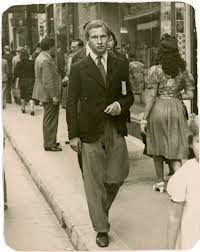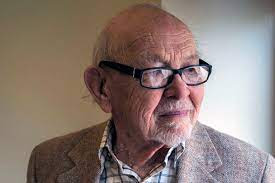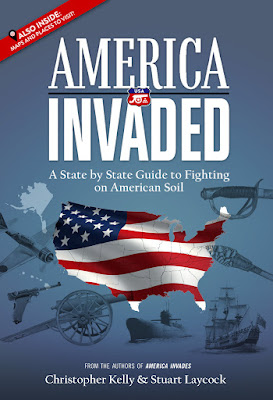Justus Rosenberg, the author of The Art of Resistance (www.amzn.com/0062742191) turned 100 years old in 2021. This centenarian was born in Danzig (Gdansk) to Jewish parents. His father was a prominent businessman. Rosenberg grew up speaking German. The Free City of Danzig held a unique political identity. It was a port, a financial center, an entrepôt filled with ethnic Germans and Poles. In the 1930s it was a curious mix of Nazis, Jews and fence sitters. Danzig was teeming with anti-semitism and persecution of Jewish businesses was a factor in driving Rosenberg from his homeland as a young man. In 1937 Rosenberg left for Paris to pursue his study of French literature at the Sorbonne.
 |
| Hitler founder of the Woke movement? "Deutschland Erwache!" |
On his journey to France Rosenberg stopped to visit Berlin where he was hosted by his uncle Martin who was a distinguished music conductor. While he was in Berlin he went to the Sportpalast to see Hitler give a speech which urged Germans to wake up ("Deutschland erwache!") Rosenberg's kindly uncle did not exactly approve of his nephew's curiosity about the Führer, but he had faith in the German people. Martin Rosenberg would later perish at Auschwitz along with so many others.
 |
| Young Justus Rosenberg |
Rosenberg was enchanted by Paris and all of the charms that it could afford a young man. He worked as an extra at a theater production of Eighty Days Around the World. He walked the streets of Paris as a self described "Flâneur" (loafer). He had a gift for language becoming fluent in German, French and English. Hitler's invasion of Poland in September 1939 brought the loafing to an end. Poland was quickly overrun by the German Blitzkrieg. Danzig was fully absorbed into the Reich and Rosenberg's immediate family had been fortunate to escape its occupation. The "Phony War" or 'Sitzkrieg" provided a few months of respite from the full horrors of war. But these days were shattered by the fall of France and the Low Countries in the spring of 1940.
As the Nazis marched into Paris Rosenberg fled and tried in vain to enlist in the Polish army in exile. Arriving in Bayonne he just missed a ship filled with Polish volunteers headed to England. He drifted to the south of France where he eventually met Varian Fry, an American who founded the Emergency Rescue Committee (ERC). Rosenberg was hired by Fry to work as an "office boy" assisting in the ERC's work of spiriting out refugees from Nazi-Occupied Europe to America. The ERC is credited with saving the lives of hundreds of intellectuals and celebrities such as Andre Breton and Marc Chagall. Fry was expelled from France by the Vichy government. Rosenberg delivers his opinion that Fry was somewhat over-rated.
In August of 1942, not long after the ERC's expulsion, Rosenberg was rounded up by the collaborationist government along with many Jews of different nationalities and sent to an internment camp. This camp was designed to be a way station prior to being sent to concentration and forced labor camps further east. Rosenberg sensed the danger that he was in and put his acting experience to work feigning the symptoms of peritonitis. He must have put on a convincing performance as the camp doctors removed his appendix! Soon after recovering in a nearby hospital he managed to escape with the assistance of a local priest. A close shave indeed!
Rosenberg then managed to join the French Resistance which was being supplied by Britain's Special Operations Executive (SOE) and America's Office of Strategic Services (OSS). He learned how to assemble and fire a Bren gun. He trained to become a guerrilla fighter. Rosenberg participated in several ambushes of German and was once wounded in the leg.
Many readers will be familiar with the Allied landings in Normandy (Operation Overlord) that began on June 6, 1944. Less well know was Operation Dragoon which landed a force of around 150,000 men in the south of France beginning on August 15, 1944. The French Resistance was doing all it could to prevent the reinforcement of the German encirclement of the Normandy beachhead. It was blowing up rail lines, attacking German convoys, etc.
 |
| 636th Tank Destroyer Battalion |
Rosenberg's service in the US Army helped him to get a visa to immigrate to America after the war was over. In the US he embarked on an academic career focussed on language and literature. He taught at Bard College in New York's Hudson valley for many years. He became a US Citizen and was, after an interruption of 15 years, finally reunited with those of his family members that had miraculously survived the war.
In 2017 Justus Rosenberg was awarded the rank of Commandeur de la legion d'Honneur by France. At the ceremony he reflected on a Bertolt Brecht quote: "Pity the nation that is need of great heroes". He also noted the traditional Jewish notion of Tikkun olam -- a duty to repair a broken world.
Rosenberg was blessed by courage and good fortune. A Roman Catholic priest once told him, "It is obvious that God had his finger on you." Rosenberg, though ambivalent about religion, has blessed our world with his presence.
Justus Rosenberg was and, blessedly, remains a great hero. As a young man he fought for the principles that lie at the core of Western society. He was incredibly fortunate to survive the bloodiest war in human history. He has spent his life trying to repair our broken and often pitiful world. As an old man he created amazing memoir -- The Art of Resistance (www.amzn.com/0062742191). This work is an instant classic that ranks right up there with other WW2 memoirs such as Iris Origo's War in Val d'Orcia (https://www.blogger.com/blog/post/edit/4122629330054677829/4489448262907642900) and Audie Murphy's To Hell and Back (https://www.blogger.com/blog/post/edit/4122629330054677829/5378325722810460075). Vive Justus Rosenberg!
If I ever had the honor of meeting Rosenberg I would have a single question: "Why did it take you so long to tell your story?"



